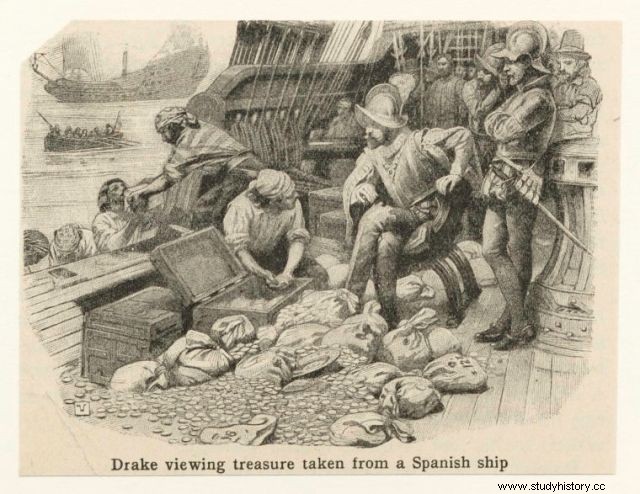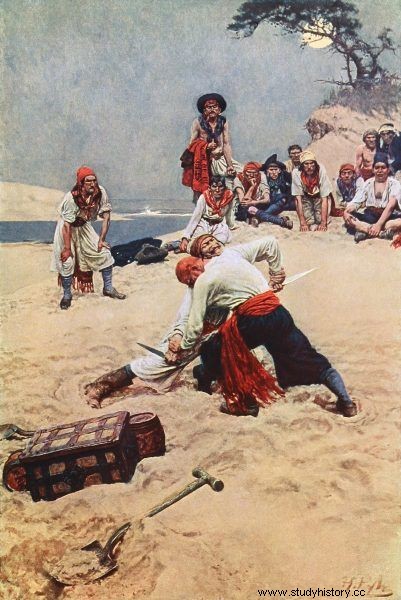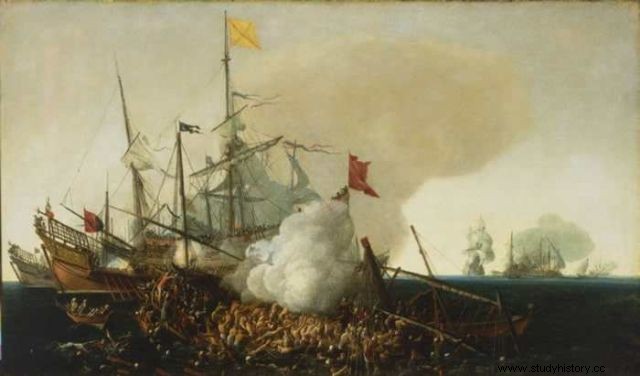Hundreds of ships, thousands of pirates, entire villages, cities and islands overrun by bearded rum lovers screaming "arrgh!" All this has never really happened.
The golden age of piracy. It is not known for sure who coined this term, but it has been used in science and popular culture for a good hundred years. At the turn of the 19th and 20th centuries, John Fiske wrote: Pirate practices have not developed on such a scale at any other time in the history of the world as in the seventeenth century and in the first part of the eighteenth century. A strong statement considering that pirates have been a pain in every age. Even the ancient Roman Empire couldn't cope with them.
The good old days
One thing is beyond doubt. On the threshold of the Age of Enlightenment, the conditions for the development of maritime banditry were undoubtedly favorable. On April 11, 1713, the great conflict between the major European powers ended. This so-called "War of the Spanish Succession" was largely fought at sea by all, even the most ruthless, means.

The corsairs did exactly what the pirates did. Only in the light of the law.
Each side used the services of privateers, whose job was to raid enemy ships, sink ships, disrupt trade, and plunder anything of any value. During the war, they seemed to be the ideal armed force. You didn't have to pay them a penny. They were given a privateer letter entitling them to plunder, and then they made a living on what they had looted.
Frustrated unemployed
The problem arose with the conclusion of peace. About 6,000 privateers lost their livelihood in the British Empire alone. People ready to continue in the only profession known to them quickly appeared among them. Only that it is already illegal and against every ship that comes across. Even - against my own countrymen.
The acts of piracy took place primarily in the waters of distant colonies - in Africa, and, of course, along the coast of North America. Where the authorities were weak, corrupt and often completely helpless. There was a panic in London. It has become common to believe that there are thousands of pirates. At least! And that they will soon become an insurmountable force.
Cheeky niggas
What terrified bureaucrats became a source of hope for the common people. In America, few fared. Most of the settlers came to the colony penniless, and only ran into debt on the spot. Even worse was, of course, the fate of black slaves ( read more about this in another article! ). They all easily believed that… pirates would save them from oppression!
The governor of the Bahamas wrote in 1718:
The niggers have become so brazen and audacious these days that we have reason to believe that with this uprising they are preparing the ground for an escape to pirates .
In turn, for the white poor on the continent, pirates have become a model of how society should be organized. Perhaps, completely unknowingly, they aroused the desire to overthrow the colonial authorities and ... introduce democracy in America.
Robin Hood with an eye patch
As Colin Woodard explains in his book The Pirate Republic, pirates have become "people's heroes" for entire towns and villages. In their own way, they became the first champions of US independence. Decades before a similar idea got any support from the elite.
Even His Majesty's sailors, sent in pursuit of pirates, dreamed of joining the enemy. Whenever there was an opportunity, they switched to the pirate side. In 1718, a whole group of sailors of the British ship HMS Phoenix sneaked out at night, so that by dawn they were already serving under the black flag against their own people.

Rum, duels and… spreading democracy! Typical pirate entertainment?
Very loud "Arrgh!"
Colin Woodard in "The Republic of Pirates" reports that the pirates quickly managed to do:
(...) cut off Great Britain, France and Spain from their overseas colonial empires and sea trade routes, disrupt communication between continents, and stop the flow of slaves to sugar cane plantations in America and the West Indies.
And it wouldn't be surprising, were it not for the fact that these pirates ... never really existed.
Age That Wasn't There
Contrary to what is as common in the 18th century as it is today, the Caribbean did not have thousands of outlawed renegades at all. Colin Woodard puts it bluntly: behind the storm that shook the empire were only twenty or thirty captains and several hundred pirates.
The "golden age of piracy" itself was by no means an age either. Yet John Fiske claimed that it lasted almost 70 years - from 1650 to 1720. Then this period was gradually shortened. Angus Konstam, author of the cross-sectional work “Piracy. The Complete History ”states that, according to the renowned specialist David Cordingly, this period stretched from 1698 to 1722. Konstam himself shortened it to just eleven years - from 1714 to 1725.

The golden age of piracy ended surprisingly quickly…
Colin Woodard has been quoted several times already, quite brutal. It is only a decade for him. From 1715 to 1725. It was enough that the crew of one of the most famous pirates, Bart Robers, was captured and executed, and the house of cards fell apart.
Does that mean it's time to stop worrying about pirates? On the contrary. There were several hundred of them, and thanks to their cleverness, skillful propaganda and Robin Hood-worthy acts, they brought the most powerful world powers to their knees . Finally, we must ensure that this feat becomes history.
